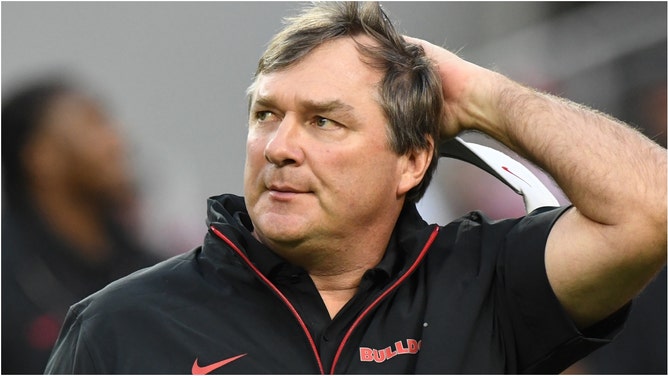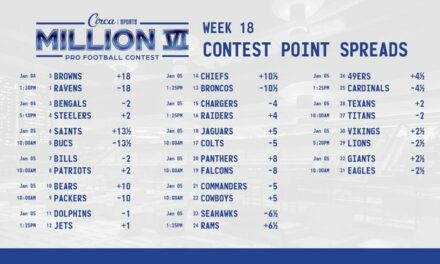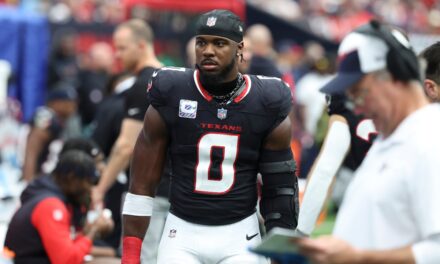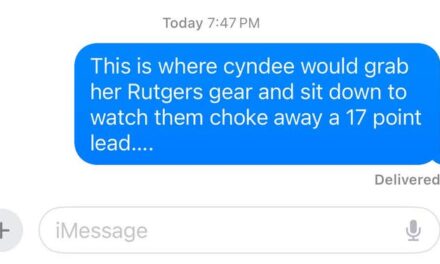We support our Publishers and Content Creators. You can view this story on their website by CLICKING HERE.
It’s hard to blame Kirby Smart for being upset after his Georgia Bulldogs lost 23-10 to Notre Dame in Thursday’s Sugar Bowl in New Orleans.
Georgia played a brutal schedule, lost just twice, beat a very good Texas team twice to secure a bye and seemed poised to win its third National Championship in the last four seasons. But Carson Beck’s season-ending elbow injury meant the Bulldogs had to turn to backup Gunnar Stockton against one of the best defenses in the country.
Still, after the losing effort, it would have been appropriate to give credit to Notre Dame for thoroughly dominating much of the game, including handily winning the battle of the trenches when Georgia was on offense. In one answer though, Smart seemed to imply that the seeding process with the current iteration of the playoff format is partially to blame.

Kirby Smart doesn’t seem interested in giving too much credit to Notre Dame after the Fighting Irish dominated Georgia in the 2025 Sugar Bowl (Credit: Getty Images)
Kirby Smart Seems To Blame Format For Georgia’s Sugar Bowl Loss
In the press conference following the loss, Smart opened by saying that Notre Dame deserved credit for playing a tough brand of physical football. But he also said that officiating was to blame for Georgia jumping offside late in the fourth quarter that helped end any chance of a comeback.
When asked why he didn’t call a timeout, Smart said he didn’t want to play into Notre Dame’s hands. Then he said he’d been told that it wasn’t legal to sub 11 players off and 11 players on.
“Didn’t want to because that’s what they wanted,” Smart said. “They wanted us to burn a timeout there and try to do it. And we subbed. So it’s really unfortunate, because I’ve been told by our head of officials in the SEC that you can’t do that. You can’t run 11 on, 11 off. We did it in 2017 against Tennessee. We’ve carried that. We practiced that and repped that because teams try to do it, and we were told by officials you could not do that. And so we were trying to say you couldn’t do it. We got our defense out there. We were fine. I mean, I would have gone for it if I was them. I don’t think they were planning on going for it. They were going to hard-count us. We prepare for that. We do it every week. We jumped offsides, you know? But we also were told you couldn’t do that in our league.”
But what Notre Dame did was perfectly legal. Georgia just wasn’t prepared for it.
Then, he blamed the officials for not calling roughing the kicker when Notre Dame ran into the Georgia punter twice in a row.
“They had two roughing the kickers that were running into the kicker. That’s a subjective call, right? So that’s a decision he has to make as to what it is. Those could be first downs,” Smart said.
Another question focused on whether Georgia had a disadvantage with a bye, considering the four teams with byes all lost their games.
“I don’t know. I mean, I look at what Vegas says and it went kind of what Vegas said, you know what I mean? I mean, at least in those two games. I guess ours was a — I don’t know what it was. It was close. But two of those teams were better than the other teams, to be honest with you. And that is what it is. That’s more about the seeding process and where it is,” he answered.
“But I’m not here to complain about anything. Given the opportunity, Notre Dame lost probably their best defensive player, so I don’t know how that’s an advantage.”
The implication here is that the seeding process led to disadvantages for some teams, like Oregon that had to face Ohio State, and Georgia with Notre Dame. While Penn State was rewarded with Boise State and Texas played Arizona State. Though obviously that game came down to the wire regardless.
Still, Smart spent much of the SEC Championship postgame talking about how difficult it is to play the SEC schedule and how tried and tested they were. Then his team got thoroughly outplayed by a Notre Dame team using its own brand of football.

 Conservative
Conservative  Search
Search Trending
Trending Current News
Current News 





